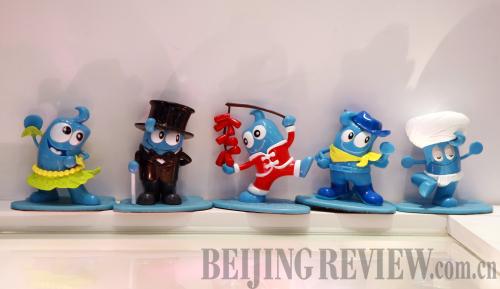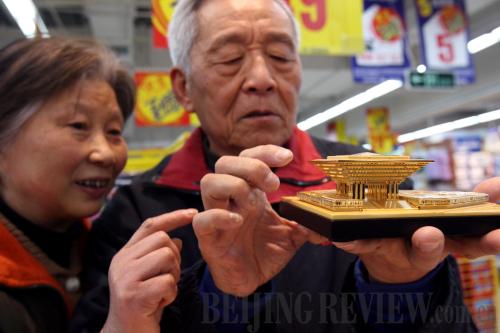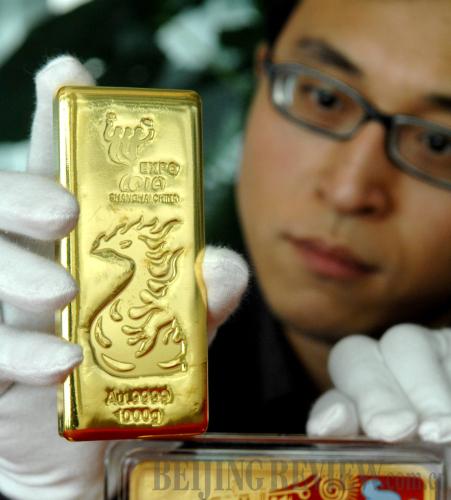| 
 |
|
OLDEN OPPORTUNITIES: Precious metal Expo souvenirs are in high demand (XINHUA) |

What are the most popular franchised commodities for World Expo 2010 Shanghai? In Dong Huangling's view, the answer is Haibao. Haibao, the mascot of the Expo, has become the most sought-after product at the flagship store on Nanjing Road in Shanghai, the city's most bustling street. Dong, the store's manager, says the happiest moment of her day is when she helps customers pack their goods and sees them leaving with a happy smile.
"The plush [Haibao] toys have been selling hot since they entered the market in 2007," the manager told ChinAfrica. She said most customers thought Haibao best represented the image of the Expo, with its trendy style and novel design that appeal to people of all ages.
Zhang Bingquan is among the Haibao fans. "I bought a large-sized stuffed Haibao doll for my daughter's birthday and some licensed products like cups, bags and spectacles for friends," said the man in his late 40s, who is on business in Shanghai.
A total of 4,000 varieties of the franchised Expo commodities are being sold, including toys, clothes, stationery, and rare metal ware. And the range of products will double after the Expo begins in May.
Apart from the soft mascot toys, other popular items being snapped up by tourists and locals include fashionable cell-phone straps, multicolored pens, mugs with the Expo logo and commemorative coins, with prices ranging from about $1 to thousands of dollars.
"Now, we are offering a discount of nearly 50 percent for the Haibao mascot products and the stock has almost run out," Dong said, adding that the price will remain at the current level until October when the Expo concludes.
"We are usually short-staffed because the customers are queuing up for a long time to buy gifts," Huang said.
Similar enthusiasm was seen at the Expo's outlet in Gongmei Mansion on Beijing's Wangfujing commercial street. According to Yang, a salesperson at the shop, daily sales of franchised commodities have topped tens of thousands of yuan, just one month after the store opened in February.
"Both domestic and overseas customers have been coming in to buy Haibao," she said.
Sales value of franchised commodities for the Shanghai World Expo had reached 8 billion yuan ($1.2 billion) by mid March, according to the marketing department for the Bureau of Shanghai World Expo Coordination.
The office hopes the sales of the Expo souvenirs will reach 20 billion yuan ($2.9 billion) when the six-month event concludes, trying to maintain the same level as that of the Beijing Olympics in 2008.
"The Expo is now the talk of the street. Every Chinese wants to be part of it and so do foreigners," said Dong Huangling, expecting better business as more tourists coming to Shanghai.
Souvenir or investment?
Dong showed ChinAfrica the precious souvenirs, such as the 1-kg gold bar and 100-g gold model of the China Pavilion, which cost a whopping 320,000 yuan ($47,058) and 39,800 yuan ($5,852) respectively. These have also enjoyed good sales, especially among high-end collectors.
Shanghai Expo souvenirs carry a lot of meaning for Chinese people, as such souvenirs are an everlasting memento with investing values, just like those from the Beijing Olympic Games, said Xu, an amateur collector from Shanghai. He snapped up a set of Shanghai Expo gold bars as soon as they were placed on the shelves last year.
"The first [souvenir with investment value] I bought was a set of commemorative Olympic stamps to mark the 500-day countdown to the Beijing Olympics," he recalled.
Xu did not initially regard the souvenirs as an investment, but his stamps featuring the Olympic emblem and mascot, which he purchased for 50 yuan ($7.3) each, spiraled to over 100 yuan ($14.7) just a couple of days after their release.
He then sold his Olympic emblem stamps at around 125 yuan ($18.3) each, making a tidy profit.
"Though I didn't make a fortune overnight from trading stamps, I was delighted to discover they have soared in value. So I have begun to shift my focus from souvenir collection to investment this time," Xu said.
In fact, interest in "expo collection" activities is blossoming nowadays.
"It's hard to pin down exactly when and why such enthusiasm for souvenir investment first appeared, either consciously or unconsciously," said Lin Lianggu, a collection expert with the China Association of Collectors (CAC).
Lin explains that investment in souvenirs has been surging in recent years as major sports events, expos, and themed-activities that the government organizes have become more prevalent.
The 184-day Shanghai Expo is just another round of buying enthusiasm.
The first batch of 2010 Expo commemorative gold bars sold out within a month of their release in December of 2008. Hours before the sales officially started, impassioned collectors were already queuing in long lines outside the expo-licensed stores. This expensive souvenir sold out in a flash with many buying more than one set.
With the advent of precious expo-themed investment souvenirs, like gold bars, commemorative coins and other items, Chinese buyers are viewing the event as a golden investment opportunity, said Peng Rongqian, a member of the Shanghai Collectors Association.
But despite the Expo-themed souvenirs selling like hotcakes among impassioned collectors, analysts remain skeptical as to whether the costly collections will translate into real gains.
Wu Shaohua, a veteran collector and president of the Shanghai Collectors Association, cautioned that Olympic memorabilia suffered slumping prices soon after the event. "History repeats itself. The value of [the Expo] collections will decline in the wake of the event," he said.
Li Xiang with CAC echoed this view. For the investors who buy Expo souvenirs in the hope they might one day be worth a fortune, Li had some succinct advice: look before you leap.
He said that although the value of some items might soar at first, the collection will almost certainly devalue.
He cited the example of souvenirs commemorating Hong Kong's return to China. In 1997, commemorative coins issued to mark the event were selling at up to 500 yuan ($73) apiece shortly before the event, but their value fell to less than 20 yuan ($2.9) soon after the event, Li said.
He advised people to pay more attention to the cultural and historical value of the items they collect rather than whether the collection's value is about to rise.
Perfecting the memento
Not everyone buying Expo-themed commodities is in it for the investment; the majority bring souvenirs home as a memento.
Zhang Yunxing, traveling in Shanghai, said that he has bought a dozen mobile phone straps for friends. "They [souvenirs] are not just fashionable, fun to customize, but also inexpensive. More importantly, their eye-catching design has powerful appeal to the younger generation," the 25-year-old told ChinAfrica.
An industry insider believes that design is the key to successful sales of souvenirs. "We could hardly expect much profit from souvenirs without an attractive design," said Shen Jianying, manager of the Souvenir Department of the Beijing-based China Millennium Monument.
She said souvenirs should embody unique elements that reflect a city's character. In the case of Beijing, that means its position both as a modern city and a traditional ancient capital. Whether the design reflects the spirit of the city and its citizens is an important factor for consideration.
In addition, tourists with different cultural backgrounds have developed different consumer demands for travel souvenirs. "It [the design of souvenirs] needs to be constantly adjusted to satisfy the ever-changing market," Shen added.
Different travel markets require different souvenirs that can symbolize the place's own identity.
Memories of a tour in London may be brought back by a mug featuring images of Buckingham Palace. A miniature Eiffel Tower may remind you of a visit to Paris. Imagine you're on a visit to Beijing, what would be your choice of a symbolic souvenir of the city?
Avid traveler Zhang Yuan, who taught Chinese in Paris, said what attracted her most to a French refrigerator magnet she brought back to China was its "distinctive French flavor."
"They impressed me a lot with the images of Notre Dame, the Mona Lisa, and lavender, all of which symbolizes France," Zhang said. "And each costs only 1 euro."
By comparison, she says it was hard to pick up symbolic souvenirs at the Imperial Palace in Beijing. "You could only discover dull and similar porcelain works, tea sets, vases, and albums of paintings that can be found at every scenic spot in the country."
According to tourism expert Wei Xiang with Beijing International Studies University, Chinese souvenirs are less competitive on the world stage, due to a lack of attention to creativity in design, outstanding designer talent and sufficient investment in independently developed brand names.
Wei suggested that at the beginning of the process a tourist satisfaction survey should be conducted and then, using the feedback, more choices of functional, meaningful and aesthetically beautiful souvenirs could be created for the market.
This is what Shanghai has done when designing Expo franchised commodities.
The Expo-themed products blend elements of Shanghai and Chinese civilization, such as Chinese characters, embroidery, and the Chinese zodiac, in a bid to capture customers.
"So far the Expo souvenirs have received a very warm welcome," said Xu Ming, a designer of Expo commodities. "We will bring out more exquisite artifacts as the show goes on."
(Liu Wei also contributed to this article) |